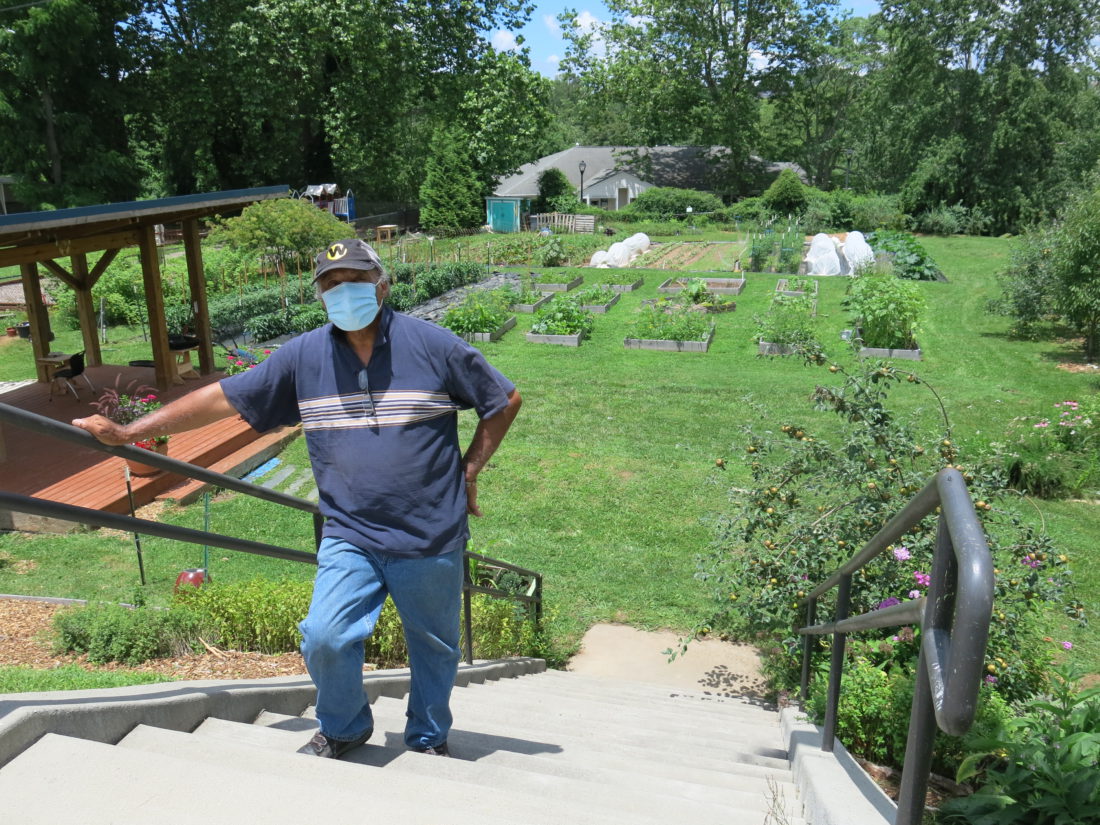Looking over raised beds, fruit trees and rows of colorful vegetables, Roy Harris laughs at the irony of his involvement with the Southside Community Garden. “Fifty-two years ago, I stood on the edge of our family garden in Hyde County, North Carolina, with my father and basically turned the pitchfork and hoe over to him and said, ‘Daddy, I’m out of here. I’m not a dirt farmer. I’m headed to college to become an engineer.’”
Now, the 70-year-old retired engineer has his hands in the dirt again, plucking weeds and watering plants on the quarter-acre site of the community garden, which Harris helped launch six years ago.
The initiative has taken on greater meaning in the wake of COVID-19, Harris says. Food insecurity is a particular problem in the predominantly low-income Southside neighborhood. Gardening, he continues, is one way to combat the issue. And it’s a message Harris shares with residents, young and old. “We teach people that if you have a 4-by-8 spot in your yard or wherever, you can always go out and pick your own salad,” he explains.
Along with his physical labor, Harris contributes his activism to local advocacy groups. He’s especially committed to promoting and improving his Southside neighborhood. On July 7, he hosted members of the Dogwood Health Trust at the community garden.
“I wanted to make sure we’re on their radar,” Harris says of the $1.5 billion foundation, which was created from the proceeds of the sale of nonprofit Mission Health to for-profit HCA Healthcare in 2019. DHT funds programs to improve the health and well-being of Western North Carolina residents.
On a tour of the garden, Harris stops before his latest project, a raised bed he calls “The Asheville City Garden.” He intends to represent the entire community within the 32-square-foot plot. Among the many plants already featured, collards are a nod to the city’s African American population, peppers symbolize the area’s Latinx groups and a series of colorful flowers acknowledge the region’s LGBTQ community.
“And then I have what they call the three sisters — corn, squash and the bean — all planted together,” Harris says. “It’s a Native American technique. The corn grows up, the bean runs up the corn’s stalk and the squash covers the ground to keep the grass from growing.”
Looking back over the garden, the retired engineer says, “I’ll be here as long as I can. As long as I can walk up and down the hill.”
This article is part of COVID Conversations, a series of short features based on interviews with members of our community during the coronavirus pandemic in Western North Carolina. If you or someone you know has a unique story you think should be featured in a future issue of Xpress, please let us know at news@mountainx.com.




Before you comment
The comments section is here to provide a platform for civil dialogue on the issues we face together as a local community. Xpress is committed to offering this platform for all voices, but when the tone of the discussion gets nasty or strays off topic, we believe many people choose not to participate. Xpress editors are determined to moderate comments to ensure a constructive interchange is maintained. All comments judged not to be in keeping with the spirit of civil discourse will be removed and repeat violators will be banned. See here for our terms of service. Thank you for being part of this effort to promote respectful discussion.